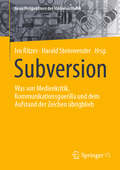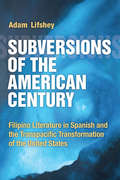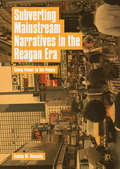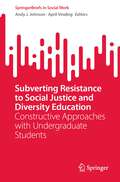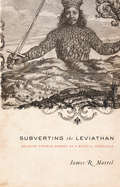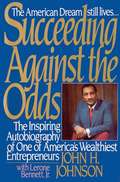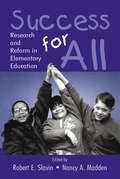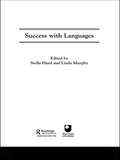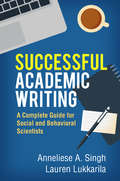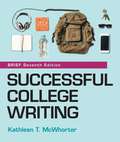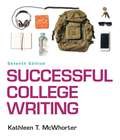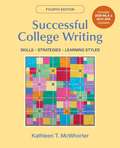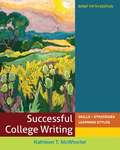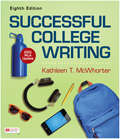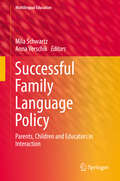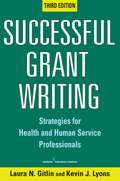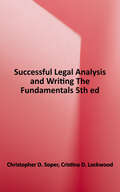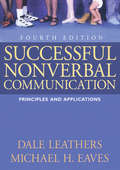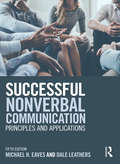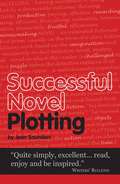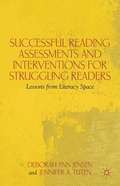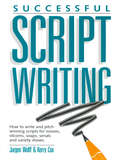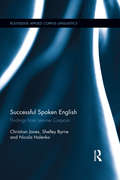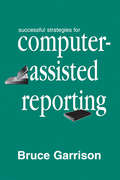- Table View
- List View
Subversion: Was von Medienkritik, Kommunikationsguerilla und dem Aufstand der Zeichen übrigblieb (Neue Perspektiven der Medienästhetik)
by Ivo Ritzer Harald SteinwenderGalt einst noch als Primat „neulinker“ Medienkritik, im „Pop" das Widerständige, das subkutan Aufklärerische, überhaupt ein grundsätzlich subversives Potenzial zu erkennen, so müssen wir heute in der postbürgerlichen Gesellschaft neotribaler Rackets einen doppelten Backlash konstatieren, der – in Theorie wie kultureller Praxis – Pop oft identitär und damit: reaktionär deutet. Die Autorinnen und Autoren dieses Bandes fragen, was von den subversiven Konzepten der „semiologischen Guerilla“ (Eco) und dem „Aufstand der Zeichen“ (Baudrillard) übrigblieb, was als subversiv in der Populärkultur gelten, und ob Subversion in der populären Kultur überhaupt eine „Rebellion gegen jede Form von Macht und Unterdrückung“ (Agnoli) sein kann. Der Band analysiert in Einzelstudien sowohl Theorie- als auch Kulturproduktionen aus dem Zeitraum vom Zweiten Weltkrieg bis heute, sowohl um bestimmte Traditionen historisch zu rekonstruieren als auch vor aktuellem Horizont neu zu situieren.
Subversions Of The American Century: Filipino Literature In Spanish And The Transpacific Transformation Of The United States
by Adam LifsheySubversions of the American Century: Filipino Literature in Spanish and the Transpacific Transformation of the United States argues that the moment the United States became an overseas colonial power in 1898, American national identity was redefined across a global matrix. The Philippines, which the United States seized at that point from Spain and local revolutionaries, is therefore the birthplace of a new kind of America, one with a planetary reach that was, most profoundly, accompanied by resistance to that reach by local peoples. Post-1898 Filipino literature in Spanish testifies crucially to this foregrounding fact of American global power, for it is the language of that tradition that speaks directly to the reality of one empire having wrested land from another. Yet this literature is invisible in American Studies programs, Asian Studies programs, Spanish and English departments, and everywhere else. Subversions of the American Century will change that. After Subversions, students and scholars in various American Studies disciplines as well as Asian, Spanish, and Comparative Literature fields will find it necessary to revisit and revamp the basic parameters by which they approach their subjects. Book jacket.
Subverting Mainstream Narratives in the Reagan Era: Giving Power To The People
by Ashley M. DonnellySubverting Mainstream Narratives in the Reagan Era explores how artists, novelists, and directors were able to present narratives of strong dissent in popular culture during the Reagan Era. Using but subverting the tools of mainstream novels and films, these visionaries’ works were featured alongside other books in major bookstores and promoted alongside blockbusters in movie theatres across the country. Ashley M. Donnelly discusses how the artists accomplished this, why it is so important, and how new artists can use these techniques in today’s homogenous and mundane media.
Subverting Resistance to Social Justice and Diversity Education: Constructive Approaches with Undergraduate Students (SpringerBriefs in Social Work)
by Andy J. Johnson April VindingThis compact book is constructed using psychological theory and research to empower university faculty to facilitate student engagement and address student resistance to diversity and social justice education more effectively. University faculty teaching diversity and social justice have traditionally encountered various forms of student resistance. Recent cultural trends of political opposition to teaching critical race theory and other forms of increased polarization and scapegoating with decreased levels of social tolerance have exacerbated challenges in promoting student engagement in diversity and social justice education in universities and colleges. In contrast to traditional models that tend to be confrontational in addressing student biases, the new Moving Towards Social Justice (MTSJ), Relational Partnership Development Model (RPDM) and process theoretical models seek to build on appropriate pre-existing strengths, interests, values, and the developmental readiness of students who might otherwise oppose learning about the contexts, lives, and predicaments of marginalized persons living in various intersections of gender, race, ethnicity, national origin, immigration status, sexual orientation, gender identity and ability/disability status. Emphasis is placed on the development of professional and life skills, such as wisdom and intercultural competence, which provide incentives and remove barriers to learning about social justice and diversity. Project-based learning approaches grounded in a developmental framework to foster the thriving and well-being of diverse students, collaborative partners in the community, and diverse persons served by the community partners are emphasized. The role of empirical assessment, feedback, and program refinement over time is also delineated within the models.Subverting Resistance to Social Justice and Diversity Education: Constructive Approaches with Undergraduate Students is an indispensable and timely resource for university and college instructors who teach courses or have significant portions of a class that involve education around social justice, diversity, and intersectionality issues, such as cross-cultural psychology, multicultural psychology, social work, sociology, intercultural communication, and counseling or clinical practice with individuals or families from diverse social locations. University officers of diversity, faculty development providers, and other administrators interested in empowering university faculty to increase student engagement in social justice and diversity education also would find the book a useful reference.
Subverting the Leviathan: Reading Thomas Hobbes as a Radical Democrat
by James MartelIn Leviathan, Thomas Hobbes's landmark work on political philosophy, James Martel argues that although Hobbes pays lip service to the superior interpretive authority of the sovereign, he consistently subverts this authority throughout the book by returning it to the reader. Martel demonstrates that Hobbes's radical method of reading not only undermines his own authority in the text, but, by extension, the authority of the sovereign as well. To make his point, Martel looks closely at Hobbes's understanding of religious and rhetorical representation. In Leviathan, idolatry is not just a matter of worshipping images but also a consequence of bad reading. Hobbes speaks of the "error of separated essences," in which a sign takes precedence over the idea or object it represents, and warns that when the sign is given such agency, it becomes a disembodied fantasy leading to a "kingdom of darkness." To combat such idolatry, Hobbes offers a method of reading in which one resists the rhetorical manipulation of figures and tropes and recognizes the codes and structures of language for what they are-the only way to convey a fundamental inability to ever know "the thing itself." Making the leap to politics, Martel suggests that following Hobbes's argument, the sovereign can also be seen as idolatrous-a separated essence-a figure who supplants the people it purportedly represents, and that learning to be better readers enables us to challenge, if not defeat, the authority of the sovereign.
Succeeding Against the Odds
by John J. Johnson Lerone Bennett Jr.Story of the most successful black American businessman, John H. Johnson.
Success for All: Research and Reform in Elementary Education
by Robert E. Slavin Nancy A. MaddenSuccess for All is a comprehensive reform model for elementary school that combines state-of-the-art curriculum, research-based instructional methods, assessments, and professional development with one-to-one tutoring, extensive family support services, and other strategies to ensure that every child is successful in the early grades and then builds on that success throughout the elementary years. Started in 1987, it is the most widely used of all reform designs. It is currently in about 1800 schools serving more than a million U.S. children, mostly in high-poverty schools. It is also the most extensively researched comprehensive reform program, with two dozen evaluations carried out in eight research institutions. Success for All: Research and Reform in Elementary Education is the first edited volume presenting research on Success for All in the U.S. and in five other countries for which the program has been adapted. This book presents a description of Success for All, an overall summary of all achievement studies, reviews of research, original presentations of new research, and discussions of the impacts and the implications of this research and dissemination for educational policy and practice in many arenas.
Success with Languages
by Linda Murphy Stella HurdSuccess with Languages is designed to help all students develop the skills they need to become an effective language learner and to make the most of language study. Written by experienced language teachers at the Open University, this book offers undergraduates and postgraduates crucial and practical advice on important areas such as: choosing a language and study programme setting personal goals for language learning and monitoring progress using ICT to support language learning. Each of the ten chapters features a number of exercises in order to help students assess the ways they learn and consider where improvements can be made, making the most of the media available and how to use resources effectively.
Successful Academic Writing: A Complete Guide for Social and Behavioral Scientists
by Anneliese A. Singh Lauren LukkarilaUsing rich examples and engaging pedagogical tools, this book equips students to master the challenges of academic writing in graduate school and beyond. The authors delve into nitty-gritty aspects of structure, style, and language, and offer a window onto the thought processes and strategies that strong writers rely on. Essential topics include how to: identify the audience for a particular piece of writing; craft a voice appropriate for a discipline-specific community of practice; compose the sections of a qualitative, quantitative, or mixed-methods research article; select the right peer-reviewed journal for submitting an article; and navigate the publication process. Readers are also guided to build vital self-coaching skills in order to stay motivated and complete projects successfully. User-Friendly Features *Exercises (with answers) analyzing a variety of texts. *Annotated excerpts from peer-reviewed journal articles. *Practice opportunities that help readers apply the ideas to their own writing projects. *Personal reflections and advice on common writing hurdles. *End-of-chapter Awareness and Action Reminders with clear steps to take.
Successful College Writing
by Kathleen McwhorterKathleen T. McWhorter's unique visual approach, with support for both reading and writing, helps students at any level of preparedness become successful college writers. The sixth edition of Successful College Writing builds on its beloved, proven visual tools, such as graphic organizers, flowcharts, and new graphic Guided Writing Assignments, with engaging professional, multimedia, and student readings in the most commonly assigned rhetorical modes. In response to instructor and student feedback, the new edition has been thoughtfully streamlined and redesigned. The new edition is enhanced by LaunchPad for Successful College Writing, an online course space of pre-built units featuring adaptive LearningCurve activities that help students hone their understanding of reading and writing. To package LaunchPad free with Successful College Writing, use ISBN 978-1-319-09240-5.
Successful College Writing
by Kathleen McwhorterKathleen T. McWhorter's unique visual approach, with support for both reading and writing, helps students at any level of preparedness become successful college writers. The sixth edition of Successful College Writing builds on its beloved, proven visual tools, such as graphic organizers, flowcharts, and new graphic Guided Writing Assignments, with engaging professional, multimedia, and student readings in the most commonly assigned rhetorical modes. In response to instructor and student feedback, the new edition has been thoughtfully streamlined and redesigned. The new edition is enhanced by LaunchPad for Successful College Writing, an online course space of pre-built units featuring adaptive LearningCurve activities that help students hone their understanding of reading and writing. To package LaunchPad free with Successful College Writing, use ISBN 978-1-319-09240-5.
Successful College Writing (4th Edition, with 2009 MLA and 2010 APA Updates)
by Kathleen T. McwhorterThe goal of Successful College Writing was to create a first-year composition text that covers the skills other college-level texts assume students already possess.
Successful College Writing (Brief 5th Edition)
by Kathleen T. McwhorterOther texts assume that first-year composition students already possess the basic skills they will need to succeed in college, but my own experience tells me that this is not true. That is why the author wrote Successful College Writing.
Successful College Writing with 2021 MLA Update
by Kathleen T. McWhorterThis ebook has been updated to provide you with the latest guidance on documenting sources in MLA style and follows the guidelines set forth in the MLA Handbook, 9th edition (April 2021).Using graphic organizers, revision flowcharts, and annotated readings, Successful College Writing shows you clearly how writing works. Hands-on writing activities and step-by-step drafting and revising guidance combine to help you succeed at the college level.
Successful Family Language Policy
by Mila Schwartz Anna VerschikThis book presents the forefront of research in the emerging field of family language policy. This is the first volume to explore the link between family language policy, practice and management in the light of state and community language policy in more than 20 ethno-linguistic communities worldwide. Contributions by leading scholars from eight countries and three continents offer insights in how family language policy might be interpreted from various theoretical perspectives, using innovative methodologies. In particular, the authors present novel data on successful family language practices such as faith-related literacy activities and homework sessions, as well as management, including prayer, choice of bilingual education, and links with mainstream and complementary learning, which permit the realization of language ideology within three contexts: immigrant families, inter-marriage families, and minority and majority families in conflict-ridden societies.
Successful Grant Proposals in Science, Technology, and Medicine
by Sandra Oster Paul CordoThere are many resources on grant writing in science, technology and medicine, but most do not provide the practical advice needed to write the narratives of grant proposals. Designed to help novice and experienced investigators write compelling narratives and acquire research funding, this is a detailed guide to the content, organisation, layout, phrasing, and scientific argumentation of narratives. The authors draw on more than twenty years of research and analysis of grant proposals, having worked extensively with investigators at different levels, from pre-doctoral students to senior scientists. They have used this experience to design a framework for scientific writing that you can apply directly to narratives. The guidelines and advice offered are applicable across many funding agencies, including the NIH and NSF. Featuring many real-life examples, the book covers a range of topics, from organisational alternatives to best practices in grammar and editing, overview visuals, and working with contributors.
Successful Grant Writing: Strategies for Health and Human Service Professionals
by Laura N. Gitlin Kevin J. LyonsSince the publication of the second edition of this bestselling guide, the grant world has undergone dramatic transformations, including new budget constraints and significant changes in submission methods. As the gold standard guide to grant writing for health and human service professionals in both academic and practice settings, this third edition provides an updated, comprehensive explanation of the grant writing process that will serve as an invaluable resource for novice and experienced grant writers alike.
Successful Legal Analysis and Writing: The Fundamentals
by Christopher D. Soper Cristina D. LockwoodThis work is a practical legal analysis and writing handbook. Designed for first-year students, it is also a valuable refresher text for more advanced students, and practitioners. This easy-to-read book features fundamental advice on how to communicate written and oral legal analysis from a problem-solving perspective. It features illustrative examples and templates. The fifth edition includes additional examples and models, and appendices with practice exercises and sample answers, all created in collaboration between one author with recent practice experience and one who has been teaching for over twenty years. It also incorporates professional ethical and technological considerations throughout, while providing learning objectives for each chapter.
Successful Nonverbal Communication: Principles and Applications
by Michael Eaves Dale G. LeathersSuccessful Nonverbal Communication: Principles and Applications demonstrates how knowledge of nonverbal messages can affect successful communication in the real world. This extensive revision describes nonverbal cues and their desirable and non-desirable functions while offering original tests for measuring and developing nonverbal communication skills. This text draws students into the material through helpful applications of the latest nonverbal communication research and through current examples of celebrities, sports and politicians. Significant updates are found in the chapters on tactile communication, personal appearance, political debates, intercultural communication and virtual contexts. The highlight of this rewrite is the cutting-edge scholarship that is seamlessly interwoven throughout the text.
Successful Nonverbal Communication: Principles and Applications
by Michael Eaves Dale G. LeathersSuccessful Nonverbal Communication: Principles and Applications demonstrates how knowledge of nonverbal messages can affect successful communication in the real world. Now with fifteen chapters, the fifth edition draws students in through applications of the latest nonverbal communication research and through current examples of celebrities, sports, and politicians. This extensive revision describes nonverbal cues and their desirable and undesirable functions while offering original tests for measuring and developing nonverbal communication skills. Updates include new attention to Donald Trump, Hillary Clinton, and Barack Obama, and discussion of nonverbal communication within same-sex partnerships.
Successful Novel Plotting
by Jean SaundersWhat is it about a good book that hooks the reader and makes them want more? A good plot. Every best-selling author from Agatha Christie to Terry Pratchett knows the importance of a strong story. But for the budding author it can be daunting and even confusing.How do you turn that seed of an idea into a great epic? This authoritative guide will help steer new writers through the minefield of the writing process. Using examples from her own work, and that of other top authors, Jean explains how to create memorable characters, generate cliffhangers and keep up a pace that will hook readers. And when you've done that, she even gives advice on how to work with publishers and editors to make your novel a best seller. About the Author Jean Saunders is an award-winning author of more than 600 short stories and 100 novels from contemporary fiction and historical romance to crime and erotica. She's best-known worldwide as Rowena Summers, the writer of many novels based in the West Country, and Rachel Moore, author of wartime sagas set in Cornwall.Her WW1 saga Bannister Girls was short-listed for the Romantic Novel of the Year award. A former chairman of the Romantic Novelists Association, Jean now lectures on writing and writes a monthly column for Writing Magazine. Successful Novel Plotting is the most recent in her series of how to guide books for writers.
Successful Reading Assessments and Interventions for Struggling Readers
by Deborah Ann Jensen Jennifer A. TutenOffering an overview of the Master's in Literacy program at Hunter College, the authors share its special features including parental and familial involvement, and presents six profiles of struggling readers and successful intervention strategies. The program allows one-to-one tutoring time as well as a community time for small group instruction.
Successful Scriptwriting: How to write and pitch winning scripts for movies, sitcoms, soaps, serials and v ariety shows
by Jurgen Wolff Kerry CoxSUCCESSFUL SCRIPTWRITINGLet's start with "The End." The credits roll - we see "Screenplay by ..." and there's your name. The show's a hit! It's Emmy/Oscar night, and you're seated up front. The nominations are revealed; your name is called. Your acceptance speech is memorable, an inspiration to the new writers "breaking in." Variety says your "future looks very bright." Hooray for Hollywood! But how did you get here?With talent, determination, and the help of this comprehensive guide, you'll have the wherewithal to move your dream from your mind onto the page and to succeed in this fiercely competitive, highly selective field.Starting with a basic course in scriptwriting, Jurgen Wolff and Kerry Cox teach you the fundamental skills of writing the feature film script, from original idea to finished screenplay. Then you'll learn how to apply your new-found skills to every type of television and film script: movies-of-the week, episodic television, situation comedies and soap operas.You'll also find helpful insight from the greats in the business, like Colin Higgins (Harold and Maude, Foul Play, 9 to 5), Larry Gelbart (Oh, God!, Tootsie, "M*A*S*H"), William Bickley ("Perfect Strangers," "Happy Days"), and Steven Bochco ("Doogie Howser, M.D.," "L.A. Law"). And you'll find answers to these essential questions:What fundamental skills and essential ingredients do I need to write a feature film script?By what criteria do producers and studios evaluate scripts or ideas presented to them?When should I write an outline or a treatment for my script, and what are the formats?How do I go about protecting my work?Is there a cut-and-dried technique for pitching my ideas?Every part of this book reflects the needs and realities of today's TV and film industry, providing you with insight as well as practical knowledge. With this book as your guide, you can start at the beginning and follow a well-defined path to successful scriptwriting.
Successful Spoken English: Findings from Learner Corpora (Routledge Applied Corpus Linguistics)
by Christian Jones Shelley Byrne Nicola HalenkoSuccessful Spoken English demonstrates how spoken learner corpora can be used to define and explore the constituents of successful spoken English. Taking the approach that language learners can speak effectively whilst still using some non-standard forms, this book: Examines databases of transcribed speech from learners at each different CEFR level to analyse what makes a successful speaker of English; Discusses features of communicative competence, including the use of linguistic strategies, organisation of extended stretches of speech, and sensitivity to context; Demonstrates quantitative and qualitative data analysis using corpus tools, looking at areas such as word frequency; Helps to reassess the goals of language learners and teachers, and provides recommendations for teaching practice and for further research. Successful Spoken English is key reading for postgraduate students of TESOL and Applied Linguistics, as well as for pre- and in-service English language teachers.
Successful Strategies for Computer-assisted Reporting (Routledge Communication Series)
by Bruce GarrisonComputers have changed the landscape of both gathering and disseminating information throughout the world. As journalists quickly move toward the 21st century and perhaps, a new era of electronic journalism, resources are needed to understand the newest and most successful computer-based news reporting strategies. Written to serve that purpose, this book is designed to show both professional journalists and students which of the newest personal computing tools are being used by the nation's leading news organizations and top individual journalists. It further describes how these resources are being used on a daily basis and for special projects. In recent years, computers have taken on new and dominating roles in the process of news analysis, newsgathering, and news processing. Today's forward-thinking journalists often seek guidance over what they can do to strengthen their ability to be society's information processors and managers. This volume focuses upon how successful journalists are using computers through a major national computer-assisted reporting (CAR) study of daily newspapers. The study included two national surveys and a series of personal interviews with many of the nation's leading CAR specialists. Several current examples of stories used for successful database- and online-oriented news assignments are provided as part of a series of case studies incorporated throughout the book. The additional depth of description and the presentation of portions of stories themselves should help readers to understand the complete process involving CAR-oriented journalism. Substantial analytical detail is used to discuss the extent of computer use in newsrooms, computer training, CAR projects, CAR in daily reporting, hardware and software most commonly used, levels and types of online services used in news research, and portable hardware and software. The book concludes with the author's assessment of the effects and impact of personal computing in the newsroom and the future of personal computer applications in newsgathering. Explaining and defining advanced applications or terminology for readers, the approach to the book assumes a minimal familiarity with computers, but no advanced knowledge of computer operation.
